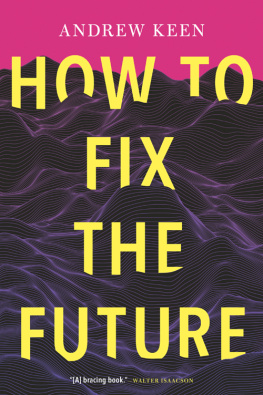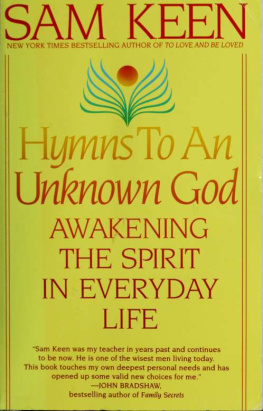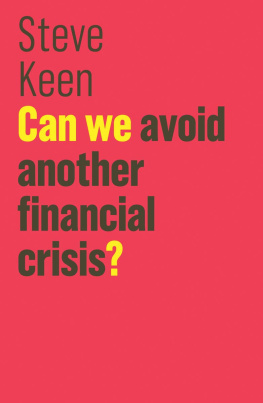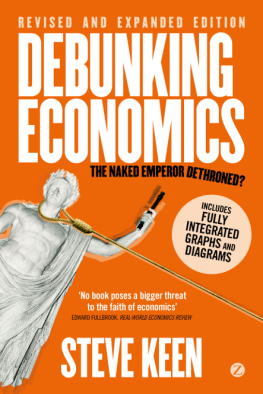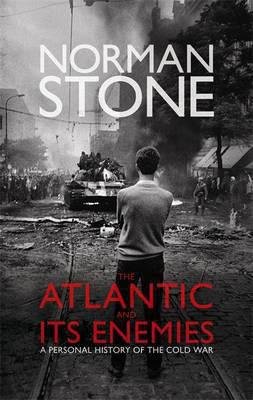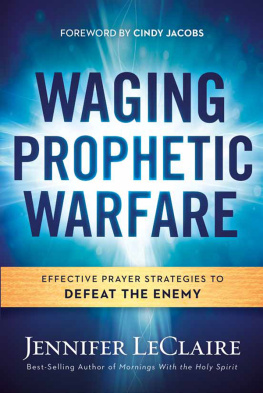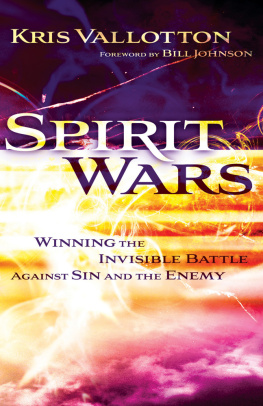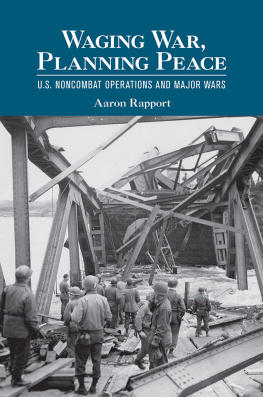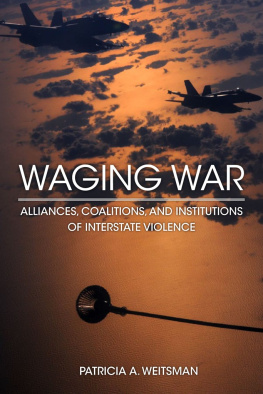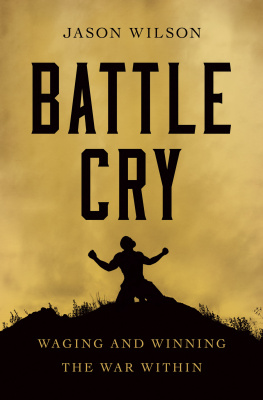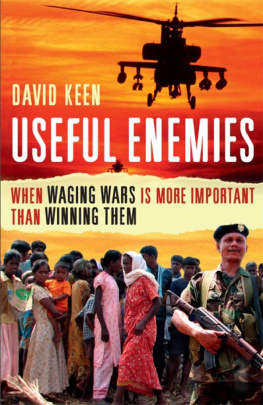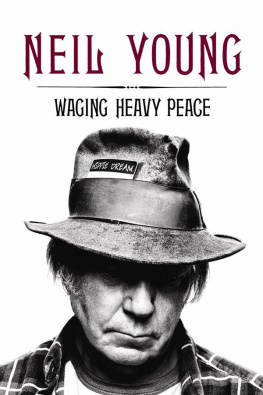Keen - Useful Enemies: When Waging Wars Is More Important Than Winning Them
Here you can read online Keen - Useful Enemies: When Waging Wars Is More Important Than Winning Them full text of the book (entire story) in english for free. Download pdf and epub, get meaning, cover and reviews about this ebook. City: Yale University Press, year: 2012, publisher: Yale University Press, genre: Politics. Description of the work, (preface) as well as reviews are available. Best literature library LitArk.com created for fans of good reading and offers a wide selection of genres:
Romance novel
Science fiction
Adventure
Detective
Science
History
Home and family
Prose
Art
Politics
Computer
Non-fiction
Religion
Business
Children
Humor
Choose a favorite category and find really read worthwhile books. Enjoy immersion in the world of imagination, feel the emotions of the characters or learn something new for yourself, make an fascinating discovery.

Useful Enemies: When Waging Wars Is More Important Than Winning Them: summary, description and annotation
We offer to read an annotation, description, summary or preface (depends on what the author of the book "Useful Enemies: When Waging Wars Is More Important Than Winning Them" wrote himself). If you haven't found the necessary information about the book — write in the comments, we will try to find it.
Keen: author's other books
Who wrote Useful Enemies: When Waging Wars Is More Important Than Winning Them? Find out the surname, the name of the author of the book and a list of all author's works by series.
Useful Enemies: When Waging Wars Is More Important Than Winning Them — read online for free the complete book (whole text) full work
Below is the text of the book, divided by pages. System saving the place of the last page read, allows you to conveniently read the book "Useful Enemies: When Waging Wars Is More Important Than Winning Them" online for free, without having to search again every time where you left off. Put a bookmark, and you can go to the page where you finished reading at any time.
Font size:
Interval:
Bookmark:


Copyright 2012 David Keen
The right of David Keen to be identified as author of this work has been asserted by him in accordance with the Copyright, Designs and Patents Act 1988.
All rights reserved. This book may not be reproduced in whole or in part, in any form (beyond that copying permitted by Sections 107 and 108 of the U.S. Copyright Law and except by reviewers for the public press) without written permission from the publishers.
For information about this and other Yale University Press publications, please contact:
U.S. Office:
Europe Office:
Set in Minion Pro by IDSUK (DataConnection) Ltd
Printed in Great Britain by TJ International Ltd, Padstow, Cornwall
Library of Congress Cataloging-in-Publication Data
Keen, David, 1958
Useful enemies : when waging wars is more important than winning them / David Keen.
p. cm.
ISBN 978-0-300-16274-5 (cl : alk. paper)
1. WarCauses. 2. Protracted conflicts (Military science) 3. WarPsychological aspects. 4. War crimes. 5. ViolenceSocial aspects. 6. Politics and war. I. Title. II. Title: When waging wars is more important than winning them.
U21.2.K427 2012
355.02'7dc23
2012003457
A catalogue record for this book is available from the British Library.
10 9 8 7 6 5 4 3 2 1
2016 2015 2014 2013 2012
Writing this book was harder than I expected, but I hope that reading it will be a little easier. In part, I am trying to bring together and find a new audience for a large body of research that has so far found outlets only in rather specialist publications or in the academic textbook Complex Emergencies. The book also draws on considerable new first-hand research notably on the causes and functions of permanent emergency in Sri Lanka and the United States.
In this task, I have been enormously assisted by Phoebe Clapham at Yale, a brilliant and courageous editor. I owe thanks to Clive Liddiard for his copy-editing, a task undertaken with dedication and fortitude under great pressure. My thanks also to Paula Clarke, who did a great job on the proofreading and index. I would like to say a particular thank-you to James Macdonald Lockhart (at Antony Harwood Ltd), my kind and patient agent, for his perceptive editorial input and steadfast encouragement.
In the hectic final stages, I am especially indebted to my aunty Ann for her energy and all-round support. I would like to thank Stuart Gordon for his very helpful comments on the Afghanistan chapter, though unfortunately he like my equally helpful anonymous reader cannot be held responsible for any major gaffes on my part. I am grateful to Mareike Schomerus for sharing, prior to publication, her fascinating paper on the Lord's Resistance Army in South Sudan. Particular thanks are extended to the Leverhulme Foundation for the Major Research Fellowship awarded to me, something that helped enormously in researching and writing this book. Thanks also to Elliott Green for stepping in for me with great skill and adaptability at LSE. I would also like to thank my (Masters and PhD) students at LSE for their stimulating company and of course, the lifeblood of my department, Sue Redgrave, Drucilla Nelson and Stephanie Davies.
In Sierra Leone, I was helped greatly by Wael Ibrahim, Karen Moore, Mark Bradbury, Ricken Patel, Comfort Ero and Dennis Bright among many others. I offer a particular thank-you to James Vincent, who helped me tremendously during my early research on the war there. In Guatemala, I was greatly assisted by Alessandro Preti, Roddy Brett and Marcus Lenzen In Serbia, I benefited greatly from the kindness and assistance of Marie-Thrse Mauro and David Shearer. In Sudan, I owe my greatest debt to Peter Cutler. In the US, I have benefited from the patience and insights of numerous war veterans and activists and I thank them warmly. In Sri Lanka, I enjoyed the company of Nicholas Crawford and many kind staff at the World Food Programme. Most importantly, I thank all the people who gave time for interviews, many of whom had suffered enormously and yet still found the strength and patience to offer their perspectives and analysis.
The book has benefited from the insights of colleagues and mentors too numerous to mention. But I would like to say a special thank you to Mark Duffield, Alex de Waal, Amrita Rangasami, Fabrice Weissman, Frances Stewart, Valpy FitzGerald, John Ryle, David Jones, Paul Richards, Mats Berdal, Adekeye Adebajo, John Harriss, Hugo Slim, Megan Vaughan, Barbara Harriss-White, Tony Vaux, Nicholas Stockton, Amartya Sen and Tim Allen.
I owe special thanks to so many friends, including Cindy, Simon, James, Wolfgang, Kaori, Haro, Eric, Edward, Chandima, Jeremy, Helen, Tim, Elisa, Natalia, Maemunah, Frederik, Huw, Thomas, Georgia, Nira, Andreas, Joel, Rajeka and Hartmut. I warmly thank my family my mum and my sister and also Joanne in the US. I would also like to thank everyone associated with St Antony's football team, past and present, for their friendship, for helping to keep me (almost) sane, and for tolerating my dwindling powers. I am very grateful to Jennifer and also everyone at Waterways nursery; also to Dr Li for his needles and fascinating conversation. Special thanks, too, to my main Oxford life-support system, Clare and Martin.
I would like to offer a big thank-you hug to Sophia, already a renowned artist and still only four. Like children everywhere, she can paint a better world. Most of all I would like to thank and dedicate this book to Vivian, my true love, compass, halcyon and shining star. Thank-you for guiding and sustaining me and keeping me, with your special grace, from the rocks!
In 1995, at one of the peaks in Sierra Leone's civil war, a young man from Kailahun district in eastern Sierra Leone told me what had happened when five armed rebels entered his village:
My younger brother was wearing a shoe boot, so they said he was a soldier. I denied it. So the armed men said we were trying to hide the government troops. I told them my brother was not a soldier. So they said I was covering for a government soldier, and in due course they will kill me. But I begged for mercy, so they never killed me. So they called up my younger brother and laid him on a long table in front of everyone and cut his throat and killed him. They asked me to clap and laugh. Having no power, I just did what they told me.
This kind of appalling atrocity became commonplace during Sierra Leone's eleven-year war, which began in 1991 when a rag-tag rebel force spilled over from Liberia. The rebels, who said they were fighting against corruption and injustice, were led by Foday Sankoh, a former soldier in the Sierra Leone army and a one-time professional photographer. They were also backed by Charles Taylor, a Liberian rebel leader who later became Liberian president. For most observers, Sierra Leone's war was at once senseless and deeply confusing and it is not hard to see why. A teenage boy recounted a rebel attack near Koribundu in the south of the country:
We decided to go to our grandfather's place, a chief. When we got there, the rebels came. My grandfather was killed by the rebels in front of the house. They put him in front of the house. They gathered his wives, and they shot him. They asked the wives to laugh.
One woman recalled how she and her cousin were put in a tiny wooden cage and rebels would drop cassava and boiled bananas into the cage as if they were animals. The woman was raped by rebels, who accused her of being a spy part of a pattern of widespread sexual violence in the war.
Next pageFont size:
Interval:
Bookmark:
Similar books «Useful Enemies: When Waging Wars Is More Important Than Winning Them»
Look at similar books to Useful Enemies: When Waging Wars Is More Important Than Winning Them. We have selected literature similar in name and meaning in the hope of providing readers with more options to find new, interesting, not yet read works.
Discussion, reviews of the book Useful Enemies: When Waging Wars Is More Important Than Winning Them and just readers' own opinions. Leave your comments, write what you think about the work, its meaning or the main characters. Specify what exactly you liked and what you didn't like, and why you think so.


